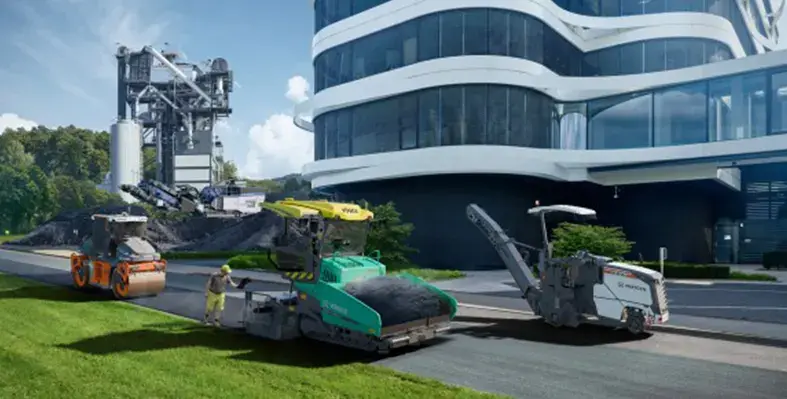Wirtgen Group, a leader in road construction technology, has introduced a groundbreaking production system designed to operate with zero emissions, combining electrically powered machines with green hydrogen technology.
Unveiled as a modular solution, the system integrates a cold milling machine, a road paver, a tandem roller, an asphalt mixing plant, and a crushing plant, all tailored for sustainable urban construction projects.
With growing pressure to reduce environmental impact, particularly in inner-city settings, this innovation addresses the need for lower CO₂ emissions, reduced noise pollution, and improved energy efficiency.
At the core of the system are three battery-electric machines: the Wirtgen W 50 Re cold milling machine, the Vögele SUPER 1300-5e road paver, and the Hamm HX 70e tandem roller.These machines, developed in collaboration with Kreisel Electric—a battery specialist majority-owned by Wirtgen’s parent company, John Deere—rely on high-voltage drive systems to meet varying power demands.Designed for small-scale urban repair and maintenance work, they remove damaged asphalt, lay new pavement, and compact it without emitting exhaust fumes.To ensure consistent operation, a mobile charging infrastructure has been engineered to power multiple machines on-site, overcoming the logistical challenges of electric construction equipment.For the energy-intensive task of crushing milled asphalt, the Kleemann MR 100i NEOe mobile impact crusher employs an all-electric E-DRIVE system, which can connect to an external power source for zero-emission performance.In areas with limited electricity, it can switch to a diesel-electric setup using HVO100, a low-carbon alternative fuel, maintaining a smaller environmental footprint.This crushed material is then reused in the asphalt mixing plant, enhancing the system’s circular efficiency.Green hydrogen focus
A standout feature is the asphalt mixing plant’s Benninghoven burner, the world’s first to run exclusively on green hydrogen.This technology significantly cuts CO₂ emissions during asphalt production, a process traditionally reliant on fossil fuels. The burner, paired with advanced control and drying systems, maximises efficiency, making asphalt production a key area for sustainable improvement in road construction.All components of the system feed performance data into the John Deere Operations Center™, a telematics platform that provides real-time insights into machine functions and battery levels. This connectivity allows contractors to monitor and manage fleets effectively, ensuring optimal performance across entire construction sites.The system’s standardised components streamline maintenance and reduce costs by using shared service parts and a universal operating interface. Beyond operational benefits, it offers a quieter working environment, benefiting both site workers and nearby residents. Contractors adopting this technology gain a competitive edge, meeting stringent municipal regulations and appealing to investors who prioritise sustainability in project funding.








